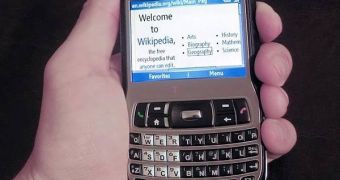Taking ultrasound images usually implies making an appointment at a hospital, and then spending a few hours until the entire scanning process is complete. But a new approach to the investigation method, devised by experts at the Washington University in St. Louis (WUSL), has the potential to make this type of test available in areas where not even hospitals are available. The technique relies on coupling the USB-based ultrasound probe technology with smartphones, resulting in a mobile platform that fits in the palm of your hand.
“You can carry around a probe and cell phone and image on the fly now. Imagine having these smartphones in ambulances and emergency rooms. On a larger scale, this kind of cell phone is a complete computer that runs Windows. It could become the essential computer of the Developing World, where trained medical personnel are scarce, but most of the population, as much as 90 percent, have access to a cell phone tower,” Washington University Associate Professor of Computer Science and Engineering William D. Richard, PhD, explained.
“Twenty-first century medicine is defined by medical imaging. Yet 70 percent of the world's population has no access to medical imaging. It's hard to take an MRI or CT scanner to a rural community without power,” David Zar, who is also a Washington University Research Associate in Computer Science and Engineering, added. The new platform is a result of a $100,000 grant that the two researchers received from Microsoft back in 2008. Every aspect of ultrasound probe design had to be checked and double-checked, to ensure compatibility between the two classes of devices.
“The idea is that caregivers, who otherwise have to transport a young person often wheelchair-bound to a hospital or clinic on a regular basis for examination, can be trained to do ultrasound to track muscle condition. This could lower the dosage to the least effective amount to further increase quality of life of the patient and the caregiver and hopefully extend life,” Zar said.
“We're really excited about this application. The caregiver would only have to do a one-minute scan, transfer the data captured to the clinic, and the results would come back to the caregiver. A group at the Washington University Medical School studying Duchene's Muscular Dystrophy is very interested in our devices and hope they can incorporate them into their research plans,” he concluded.

 14 DAY TRIAL //
14 DAY TRIAL //